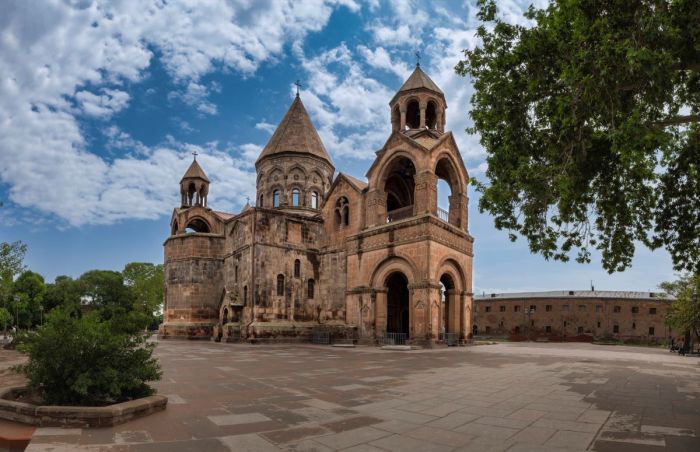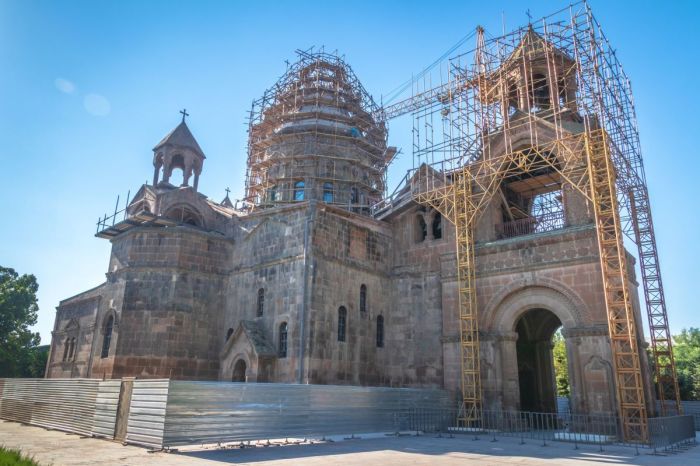
As a great-granddaughter of survivors of the Armenian Genocide, Holy Etchmiadzin has played a pivotal role in my personal life.
With hundreds of Armenian churches and other religious sites under attack by Azerbaijan in Nagorno-Karabakh (Artsakh) today, preserving the Holy Etchmiadzin Cathedral is more crucial than ever.
Throughout its long history, Holy Etchmiadzin has been at the center of spiritual and national identity for Armenians. Located in Vagharshapat, Armenia, it is one of the oldest churches in the world, having survived numerous invasions and natural disasters.
Its origins trace back to the early 4th century, when Saint Gregory the Illuminator, the founder of the Armenian Apostolic Church, established it as the seat of the Armenian Catholicos. The Cathedral is believed to have been built on the site where Saint Gregory had a vision of Christ descending from Heaven, an event which gave the Cathedral its name, meaning “The Descent of the Only Begotten.”
In many ways, the church has become a symbol of the resilience of the Armenian people, who have endured much pain and suffering. They experienced the first genocide of the 20th century when more than 1.5 million Armenians were exterminated by the Ottoman Turks. The Cathedral’s architectural style evolved over centuries, blending elements of early Christian and Armenian architectural traditions. Its significance is not only historical but spiritual, serving as the divine headquarters of the Armenian Apostolic Church. It is one of the reasons why it has become a UNESCO World Heritage Site for its outstanding universal value.
The current Vehapar, or Armenian pope, Catholicos Karekin II, began this massive undertaking in the year 2012. Although there had been numerous renovations in previous years, there had been noticeable deterioration in different parts of the Cathedral. This prompted another review of the condition of Etchmiadzin Cathedral. As a result of the investigations conducted by a committee of various experts, it was discovered that the church was in a physically concerned state, with certain sections in danger.

Taking advantage of the interior scaffolding during the renovations of the Cathedral’s exterior, the condition of the interior structural elements was also examined. Dangerous conditions hidden behind layers of plaster and frescoes were noticeable in the supporting columns and arches, side arches, and vaults. After discussing and analyzing the situation, it was decided that it would be necessary to temporarily stop the Cathedral’s religious activities to ensure the Cathedral’s preservation, durability, and safe operation.
Since then, the Cathedral has been under careful renovation and restoration work, geared to preserve the architecture and artwork of this ancient cathedral.
I was able to see the Cathedral this past summer and witnessed the incredible effort that has been put into preserving the church while also ensuring its durability and stability. This preservation effort is not just about conserving a building but safeguarding a vital symbol of Armenian heritage and identity.
As Armenia navigates complex regional and international political landscapes, Holy Etchmiadzin stands as a beacon of cultural continuity and religious heritage. The Cathedral’s preservation helps reinforce national pride and unity while offering a tangible connection to Armenia’s rich past amid the many challenges its people have faced.
The preservation of the Mother See of Etchmiadzin protects the rich heritage and history of the Armenian people at a time when so much ancient Armenian artwork and architecture is under threat by Azerbaijan. As countless invaluable religious and cultural landmarks have been desecrated and destroyed, it is essential that Holy Etchmiadzin, the center of Armenian Christianity, is safeguarded and conserved.
Without such great feats of art and architecture to represent the history and journey of the Armenian people, our rich heritage and culture will fade away.
By bridging the past with the present, the Cathedral’s restoration can help fortify Armenia’s cultural and spiritual history while laying the ground for its future.
Sirahn Toufayan is a 2021 graduate of Hovnanian School. She is a member of the AYF New Jersey “Arsen” Chapter. She attends the Academy of the Holy Angels.




